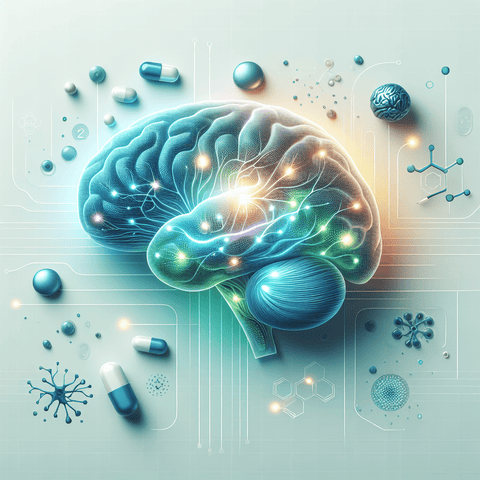Understanding the intricate relationship between nutrition and mental health has become increasingly vital in today's fast-paced and often stressful world. Many individuals seek natural ways to enhance their mood and manage anxiety without relying solely on pharmaceuticals. Among various nutrients, Vitamin B12 has emerged as a promising candidate due to its essential role in brain health and neurological function. This comprehensive guide explores how B12 can help boost your mood and ward off anxiety naturally, backed by scientific insights and practical tips.
Introduction: Understanding the Role of B12 Supplement in Supporting Mental Well-being
In recent years, mental health challenges such as anxiety, depression, and chronic low mood have reached concerning levels worldwide. While psychological therapies and medications are common treatments, there's a growing interest in supporting mental health through nutrition. The brain, like any other organ, requires a balanced supply of essential vitamins and minerals to function optimally. Deficiencies or suboptimal levels of certain nutrients can exacerbate mental health issues, making targeted nutritional support a key component of holistic well-being.
Vitamin B12, also known as cobalamin, is a water-soluble vitamin critical for neurological health, energy production, and the synthesis of neurotransmitters—chemical messengers that regulate mood and stress responses. With increasing awareness of its importance, many are turning to B12 supplements to naturally enhance mood and reduce anxiety. This article delves into how B12 influences mental health, the science behind its benefits, and practical ways to incorporate it into your routine.
B12 Supplement: An Essential Nutritional Tool for Mental Health
A B12 supplement is a dietary product formulated to provide the body with adequate levels of vitamin B12, especially for individuals who may have dietary restrictions or absorption issues. There are various forms of B12 supplements available, including oral tablets, sublingual lozenges, nasal sprays, and injectable formulations. Each offers distinct advantages, and choosing the right type depends on individual needs, absorption efficiency, and medical advice.
Many people turn to B12 supplements to address deficiencies caused by inadequate dietary intake—common among vegetarians and vegans who may lack natural plant sources of this nutrient—or from malabsorption conditions like pernicious anemia, autoimmune disorders, or gastrointestinal problems. Supplementation can help restore optimal B12 levels, which is critical for maintaining neurological function, mental clarity, and emotional stability.
Scientifically, B12’s role in the central nervous system is well-established. It participates in the synthesis of myelin, the protective sheath surrounding nerves, ensuring proper nerve signaling. A deficiency can result in neurological impairments, including cognitive disturbances and mood disorders. Hence, adequate B12 intake is fundamental not just for physical health but also for fostering mental resilience and emotional balance.
Vitamin B12 Benefits: Enhancing Brain Function and Emotional Stability
Beyond its well-known function in energy metabolism, vitamin B12 supports a spectrum of neurological health benefits that influence mood and emotional stability. It is involved in the synthesis of crucial neurotransmitters such as serotonin and dopamine, which regulate feelings of happiness, motivation, and calmness.
Research indicates that sufficient B12 levels contribute to cognitive functioning, memory, and concentration—all of which are interconnected with emotional health. For individuals experiencing mental fatigue or low mood, correcting B12 deficiencies can lead to noticeable improvements in mental clarity and emotional resilience.
More specifically, B12 aids in maintaining the integrity of nerve cells and myelin sheaths. Damage or deterioration in these structures can lead to neurodegenerative processes and mood disturbances. By supporting nerve health, B12 fosters better communication between brain cells, resulting in improved mental alertness and emotional regulation. Furthermore, studies have shown that populations with higher B12 levels tend to report lower instances of depression and anxiety symptoms.
Incorporating B12 through supplements or diet may serve as a preemptive step to bolster brain health. When combined with other lifestyle factors like adequate sleep, physical activity, and stress management, B12 supplementation can be a valuable component of a holistic approach to mental well-being.
B12 Supplement for Anxiety: Can It Help Calm Your Nerves?
Emerging evidence suggests a potential link between B12 status and anxiety disorders. Although research is ongoing, several studies highlight that individuals with lower B12 levels tend to experience higher levels of anxiety and stress. This association is rooted in B12’s role in neurotransmitter synthesis and regulation—processes directly influencing mood and emotional responses.
Neurotransmitters like serotonin, which modulate mood and feelings of well-being, require B12 for optimal production. When B12 is deficient, the synthesis of these mood-stabilizing chemicals may be impaired, leading to heightened anxiety or difficulty coping with stress. Additionally, B12 influences homocysteine levels—a metabolite linked to neurotoxicity and mental health issues. Elevated homocysteine levels, often associated with B12 deficiency, have been linked to cognitive decline and increased risk of depression and anxiety.
Clinical studies offer promising insights. For example, some research indicates that B12 supplementation can reduce symptoms of anxiety, especially in individuals with confirmed deficiency. In practice, integrating B12 into an anxiety management plan—along with therapy, mindfulness, and lifestyle adjustments—can provide a natural, supportive approach to calming nerves and enhancing resilience.
To benefit from B12’s potential anxiolytic effects, it’s advisable to consult a healthcare professional to assess deficiency status and determine appropriate dosing. Incorporating B12-rich foods and supplements can complement other natural strategies to manage anxiety more effectively.
Mood Support with B12: Boosting Your Emotional Well-being Naturally
Vitamin B12’s influence on mood management is profound, primarily through its role in neurotransmitter production and nervous system health. Deficiencies have been associated with depressive symptoms, fatigue, irritability, and emotional instability. Ensuring sufficient B12 levels can support the production of serotonin, dopamine, and other mood-regulating chemicals.
Serotonin, often called the “feel-good” neurotransmitter, plays a pivotal role in mood regulation. B12 is essential for the synthesis of tetrahydrobiopterin, a cofactor in serotonin production. Likewise, dopamine, the neurotransmitter responsible for motivation and pleasure, also depends on B12 for its creation. When B12 levels are adequate, the brain’s capacity to generate these chemicals is optimized, promoting positive mood and emotional resilience.
Conversely, deficiency in B12 can lead to symptoms mirroring depression—low energy, feelings of hopelessness, and loss of interest in daily activities. Many individuals report that supplementing with B12 has significantly improved their mood and overall mental health, especially when aligned with a balanced diet and healthy lifestyle choices.
Practical tips for using B12 as part of a mood support routine include choosing high-quality supplements, such as sublingual B12 or injections if necessary, and incorporating B12-rich foods like fish, dairy, and eggs. Regular monitoring and consulting with healthcare providers can ensure optimal levels and personalized support.
Success stories abound, with many individuals experiencing a noticeable uplift in mood after correcting B12 deficiencies or increasing intake. Ultimately, combining B12 supplementation with stress management, physical activity, and social connection forms a holistic approach to emotional well-being.
Natural B12 Sources: Foods That Boost Your Levels Without Supplements
While supplementation offers a convenient way to ensure adequate B12 intake, focusing on diet is equally important. Naturally occurring B12 is predominantly found in animal-based foods, making it accessible for omnivores but challenging for vegetarians and vegans. Common sources include meat, fish, shellfish, dairy products, and eggs.
Specific foods rich in B12 include clams, liver, salmon, tuna, scrambled eggs, and cheese. Regularly incorporating these into your diet can help maintain stable B12 levels, supporting mental health and neurological function.
For vegetarians and vegans, fortified foods such as plant-based milks, cereals, and nutritional yeasts are vital sources of B12. Additionally, dietary supplements formulated for vegans and vegetarians can fill the gaps effectively.
To maximize absorption, consider pairing B12-rich foods with other nutrients like folate and vitamin D, which work synergistically for brain health. Maintaining a balanced diet with a variety of nutrient-dense foods contributes significantly to mental stability and overall well-being.
B12 Deficiency and Mental Health: Recognizing the Connection
Many individuals may experience subtle or overt signs of B12 deficiency, which can profoundly impact mental health. Common symptoms include fatigue, irritability, depression, cognitive fog, numbness, tingling, and mood swings. Risk factors include age, poor diet, gastrointestinal disorders, medications affecting absorption, and certain autoimmune conditions.
Detecting deficiency involves blood tests measuring serum B12 levels and markers like methylmalonic acid and homocysteine. Early diagnosis allows for prompt intervention, often through dietary adjustments or supplements, leading to rapid improvements in mental clarity and emotional health.
Addressing B12 deficiency is crucial because persistent deficits can lead to long-term neurological damage and worsening mood symptoms. Healthcare professionals guide appropriate supplementation or dietary modifications, emphasizing that correcting deficiency can significantly enhance mental resilience and overall quality of life.
Selecting the Right B12 Supplement: What to Consider for Mental Health Support
Choosing an effective B12 supplement involves evaluating factors like dosage, form, and bioavailability. Common forms include cyanocobalamin, methylcobalamin, and hydroxocobalamin. Among these, methylcobalamin is often preferred for mental health support due to its active form and better absorption.
Supplement dose varies based on individual needs—some may require higher doses if deficient, while others benefit from maintenance levels. Consulting with healthcare providers ensures personalized recommendations aligned with blood test results.
Incorporating B12 supplements alongside other natural approaches—such as magnesium [see Magnesium] or vitamin D—can enhance overall mental health support. Selecting reputable brands from top vitamin suppliers guarantees product quality and safety.
Moreover, a comprehensive approach involves lifestyle modifications like regular exercise, stress management, and adequate sleep, which synergistically improve mental resilience alongside B12 supplementation.
Conclusion: Embracing Natural Strategies with B12 to Elevate Mood and Reduce Anxiety
Vitamin B12 plays a vital role in maintaining neurological health, supporting mood, and mitigating anxiety symptoms naturally. Whether through diet or supplements, ensuring adequate B12 levels can lead to improved emotional stability, cognitive function, and overall mental well-being. As research continues to underscore the connection between B12 and mental health, integrating this essential nutrient into your routine offers a proactive approach to holistic wellness.
It’s important to assess your B12 levels regularly and seek guidance from healthcare professionals to design a tailored plan that suits your specific needs. Combining B12 strategies with other nutritional support and lifestyle adjustments can empower you to achieve a healthier, more balanced mind.
Don't hesitate to explore high-quality B12 supplements available at TopVitaminE.com and consider incorporating B12-rich foods into your diet for optimal mental health support.
Q&A Section
Question: Can B12 supplements instantly improve my mood?
While some individuals notice mood improvements within weeks of correcting a deficiency, B12 supplementation typically benefits mental health gradually. Consistent use, combined with a balanced diet and lifestyle, yields the best results.
Question: Is B12 supplementation safe for everyone?
Generally, B12 supplements are safe with minimal risk of adverse effects because they are water-soluble and excess is excreted. However, people with certain health conditions or those on specific medications should consult healthcare providers before starting supplementation.
Question: How can I tell if I am deficient in B12?
Deficiency signs include fatigue, weakness, numbness, mood disturbances, and cognitive issues. Blood tests measuring serum B12 and related markers help confirm deficiency. Regular screening is recommended for at-risk populations.
Question: Can I get enough B12 from food alone?
For most people, a well-balanced diet including animal products provides sufficient B12. Vegetarians and vegans might need fortified foods or supplements to meet their needs effectively.
Question: Is B12 effective for reducing anxiety compared to other natural remedies?
While B12 may support anxiety management by improving neurological function, it is most effective when deficiencies exist. Combining B12 with other approaches like mindfulness, exercise, and nutrition offers a comprehensive strategy for anxiety reduction.
Important Keywords
- Vitamin B12 and mental health
- B12 supplements for mood
- Natural anxiety relief B12
- B12 deficiency and depression
- Neurotransmitter support with B12
- B12-rich foods for brain health
- Homocysteine and mental health
- Choosing B12 supplements
- Vitamin B12 for neuroprotection
- Holistic mental wellness strategies



